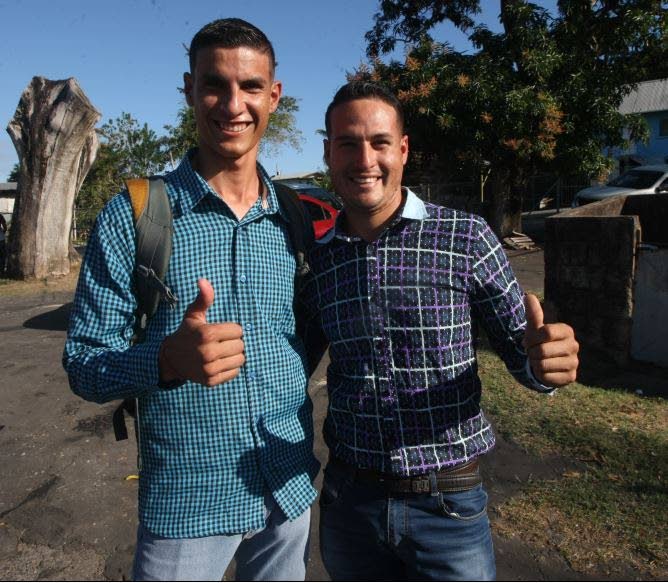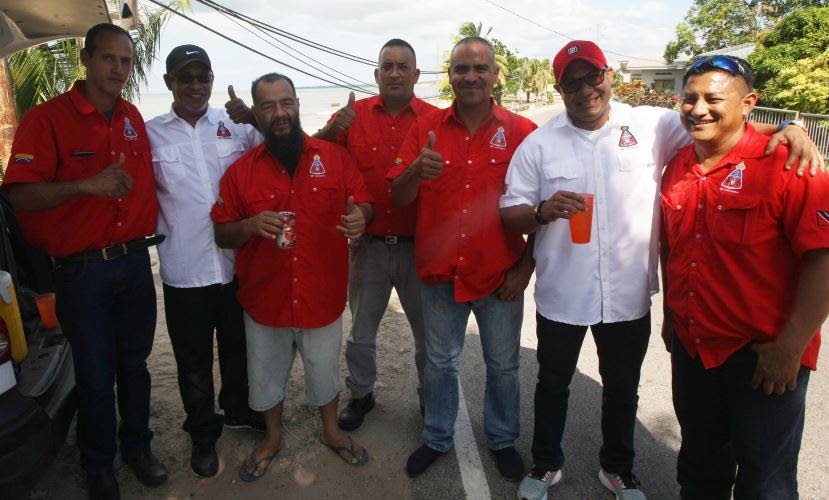Venezuelans surviving on US $6 monthly

IMAGINE surviving on US$6 a month and all you can afford is a two-pound chicken or maybe a tube of toothpaste. That is what the average Venezuelan earns per month because of the deepening crisis in what was once Latin America’s richest country.
Venezuelans flee the country daily to Trinidad and other neighbouring countries – some to purchase basic food items, to work, and others to seek asylum.
Cousins Noe Rodriguez, 23, and Jonniel Rodriguez, 21, spent 16 hours on a bus from their homes Barquisimeto to the port in Tucupita. They spent another five hours travelling by boat from there to Cedros and arrived at about 2.15 pm last Monday.
Despite the long journey, they said they were happy to be in Trinidad to visit friends.
“There are lots of tensions in Venezuela and we love Trinidad,” the elder cousin said.
To get an entry in this country, his Trinidadian friends sent them invitation letters which they presented to immigration officials. It is their first trip and they are looking forward to experiencing Carnival here.
Another Venezuelan, who did not want to give his name, said: “You cannot walk the streets while talking on the phone because someone would steal it. Every day people are leaving the country. We work hard but the money is small, about US$6 a month on average. We are suffering. The banks have no money and lines are long.”

Because of hyperinflation, Venezuela’s main currency – the bolívar soberano (Bs) – is almost “worthless” he said.
“One day US $1 equals to 2,400 Bs and the next day it could be 2,600 Bs. Today if I buy a pound of meat for one price, tomorrow it could double.”
A 64-year-old woman, who is visiting Trinidad for the first time, said she gets 19,000 Bs as pension from the Government. Speaking in Spanish, the retired public servant said, “A two-pound chicken alone costs 10,000 Bs. The money does not have value.”
Another interjected saying, “A chicken costs more than that. It is about 30,000 Bs. If I buy a box of toothpaste, my monthly salary is also done.”
As the reporter was speaking to her, a Trinidadian whispered something to her and whisked her away.
Shoemakers are using worn tyres to make and repair shoes, they said. But getting a tyre is no easy task.
“There are less and less vehicles on the road. If someone parks his car, he may find all the tyres gone.”
A return ticket by boat between Tucupita and Cedros costs about US$200, which is plenty considering the monthly salary of Venezuelans.
When asked what or who may be responsible for the declining economy, many accused the US Government of “meddling” while others praised the US involvement saying under the Nicolas Maduro-led government there is rampant corruption. They use derogatory slangs to describe the elected President as well as self-proclaimed president, Juan Guaido.
Captain of the boat —Vanguardia de la Virgen del Valle—Angel Lorenzo Smith said he previously worked taxi with another company between both countries. He and his crew were in Trinidad to seek permission to start a new service. The boat caters for 32 passengers.
“Not all Venezuelans who visit are staying. Some come for food and medicine then leave the next day. Guaido is the answer to what is happening in Venezuela. Our country was flourishing and now there is no medicine, no food.”
One man who described himself as a Chavista said Guaido is more popular internationally than in Venezuela. The “truth” is being distorted and information projected by “Yankee propaganda” do not reflect what is causing the crisis in Venezuela.
“We need change, but I don’t think Guaido is the change we need. There is a lot of misinformation via the media. But we are Venezuelans, we fight for what is right. Do you really think the US care about us? No! They are about our natural resources and will kill millions of us if they have to.”
“La lucha continua,” he said meaning, the struggle continues.
See page 15A


Comments
"Venezuelans surviving on US $6 monthly"